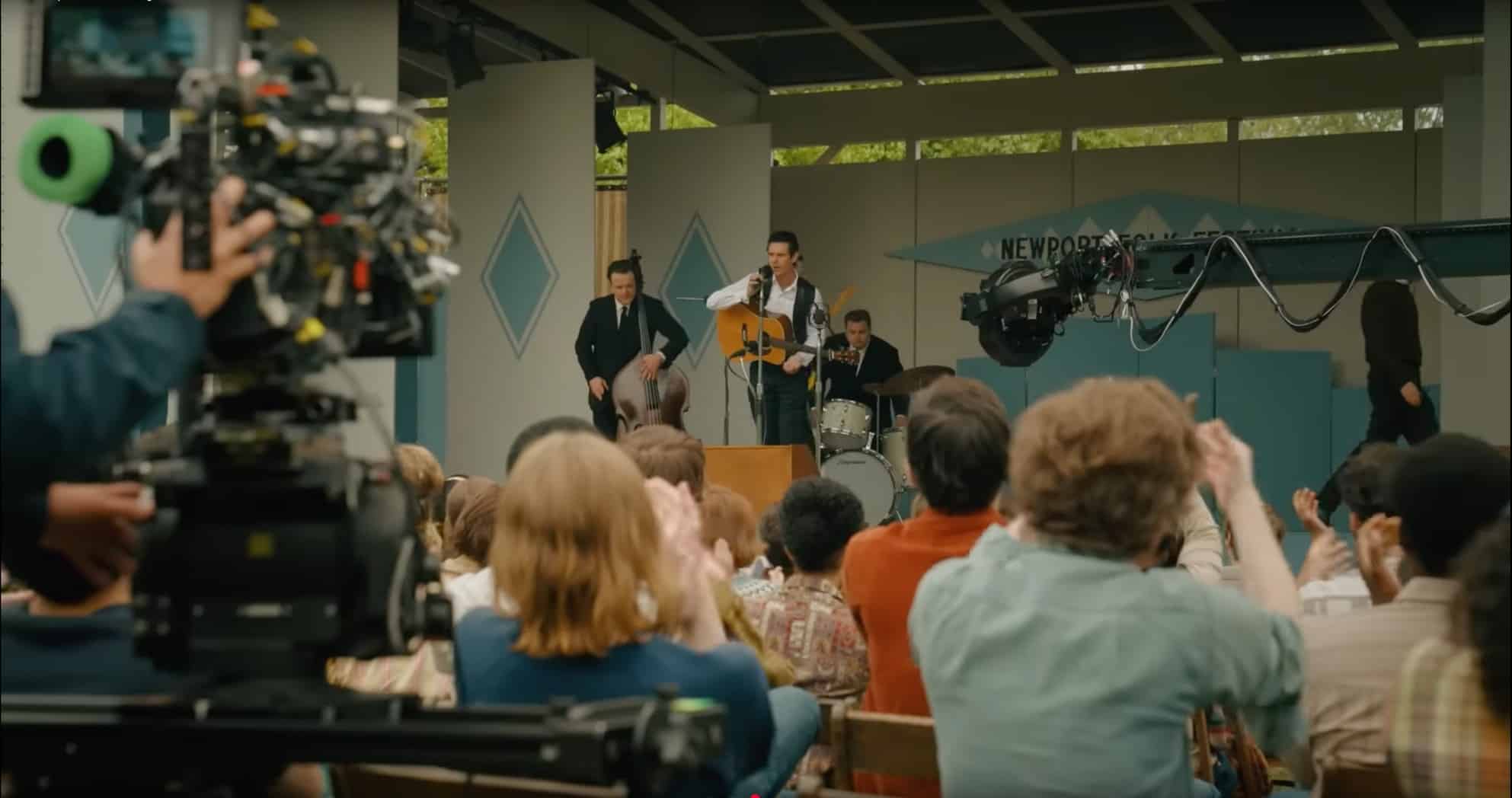The following is an interview between jazz journalist Morgan Enos and drummer, composer, and educator Douglas Marriner.
Marriner appeared as Johnny Cash’s drummer, W.S. Holland, in the Bob Dylan biopic A Complete Unknown, which was released in the UK on 17 January. A link to his website can be found at the end of this article.
I met Douglas Marriner through his sometime role as drummer in Vince Giordano and the Nighthawks, who painstakingly recreate 1920s and ‘30s jazz, often at their regular Birdland gig.
Despite his role as Johnny Cash’s drummer in a Hollywood flick about Bob Dylan, I wouldn’t immediately associate him with Dylan, or Cash, or the American folk tradition at all. Neither would he, I learned while speaking with him.
“I didn’t know much about Dylan before I did this film, really,” Marriner tells UK Jazz News. It was the same with Cash. But Marriner’s committed performance in A Complete Unknown rendered any non-history with the source material moot: even as he relatively blended into the background, he clearly did his homework.
This fastidiousness partly comes from Marriner’s background: his grandfather was the legendary conductor and violinist Sir Neville Marriner, who was also the music conductor and supervisor for the monumental 1984 film Amadeus.
“As somebody who knows Amadeus so well as part of my childhood,” Marriner says, “I could see the parallel so clearly, in the respect and the ethos of the way the film was made. That was really comforting to see.”
Below, Marriner further draws out the Amadeus connection, and tells fascinating stories about his time on the set of A Complete Unknown.
UK Jazz News: Have you seen A Complete Unknown yet?
Douglas Marriner: I actually only got to see the film last week, for the first time.
UKJN: What’d you think?
DM: I was really struck by it. I mean, obviously, I only got to see the scenes that I was in for those days in May. You only get to see one piece of the jigsaw, so it was really beautiful to witness how the whole thing came together.
You know, you see a few of the constituent parts. You see the potential for something really great, but you have no idea how it’s all going to be framed, how it’s all going to make sense together. To finally see that completion was a very gratifying experience.
UKJN: Have you been in movies or on movie soundtracks before?
DM: I’ve done some on-screen work with Vince Giordano, and that was on Feud: Capote vs. The Swans, which came out last year, with Tom Hollander as Truman Capote.
That was my first time working on screen, and this [A Complete Unknown opportunity] was actually through the same music contractor, Sandra Park.
Firstly, there’s the clear Amadeus link, and that was made apparent to me when I was speaking to Ed Norton on set. He was mentored by Miloš Forman, and Miloš was one of the minds behind Amadeus in the first place.
Ed also mentioned that [A Complete Unknown director] James Mangold was similarly mentored by Miloš Forman. So, there’s a real lineage in their approaches.
Obviously, Timmy is Bob, but the main character really is the music. They’ve put the music as the primary attraction. It’s a very generous thing for the director to invite a new audience into these songs. These songs are going to be friends to the audience forever, should they so wish.
UKJN: Have you ever played retro country music in any capacity?
DM: No. I think [I got the part] because I do a lot of vintage drumming work with Vince’s band and with Terry Waldo’s band.
There’s quite a small group of people who are known as specialists in that world, so I think that’s how I was approached to do this particular role. Not a lot of people necessarily have a deep understanding of the history of how these things were done.
It was interesting to try and play like W.S. Holland. Adopting some of the mannerisms was my own personal study. It was difficult, because W.S. Holland’s nickname was ‘Fluke’, and he was then known as the ‘Father of the Drums’. So, there are two opposing elements of legacy to contend with.
He also played the drums right-handed, but set the drums up left-handed – so I had to basically play everything with the hands right-handed, but with the feet the wrong way around. So, that was quite a challenge, to basically learn half of the drumming in reverse, just for that role. That was fun on a practical level to wrestle with.

UKJN: I wasn’t aware of Holland. Is this a figure in the Cash universe that fans talk about?
DM: Yeah. So, Holland was Cash’s drummer, and a member of the Tennessee Three. It was interesting watching Walk the Line, the Johnny Cash biopic, which was done by the same director, James Mangold.
Obviously, Joaquin Phoenix was in the original, and that was a very unique and captivating performance. But in my research, I saw how those performances were done, and they had a very sweaty and animated and almost exaggerated performance style on the drums for that particular movie.
Amongst the people who were playing in Johnny Cash’s band for this film, we agreed not to do that. We wanted to have a more stoic kind of presence on stage, which was, I think, closer to how the Tennessee Three played with Johnny Cash.
There was an unruffled element to the execution of their playing that we wanted to capture in the live scenes, so we studied their mannerisms, their playing style, their gait, and their technique. Hopefully, that came through a little bit more on this project.
UKJN: Take our readers into the Newport recreation.
DM: We shot those scenes over and over again from different camera angles. There was thoroughness in making sure that we got everything in the can, that everything was shot from every possible angle.
The other really important thing was that all the music was recorded first.
When Miloš Forman and [film producer and music exec] Saul Zaentz approached my granddad, Sir Neville Marriner, about the idea of making a film version of the play Amadeus, my granddad’s terms were, “We’re not doing any Hollywood cuts or edits. We’re not messing with Mozart’s music. We’re putting that as the prime feature, and we’re going to honour that legacy without interfering.”
I think it was one of the first times that they had recorded the music first (with the orchestra that my grandfather founded and conducted on the film, The Academy of St Martin in the Fields), and shot the filming to the music. It was never really done that way around, and they followed that model again here with A Complete Unknown.
The music was a mixture of some pre-recorded and some live elements. So, it was a very respectful treatment of the music by everybody involved.

UKJN: What was your impression of Edward Norton? His performance as Pete Seeger was one of the most impressive parts of the film, for me.
DM: Ed Norton was impressive to talk to. He comes across as uniquely competent in so many different fields. He was talking to us about jazz, because we were playing at the side of the stage while waiting to go on. He is such a universal artist in his understanding of his roles and what he does.
He also has worked with jazz musicians. He directed and acted in [2019’s] Motherless Brooklyn, on which he worked with Wynton Marsalis and many other New York jazz musicians. So, we talked about some of those commonalities as well. He really knows his stuff.
Timmy was really in the role – sort of method – all the way through. But I did give him a little drum lesson, when he was sitting at the drums between takes. We had a nice chat about Lyme Regis, which is a seaside town in Dorset where he shot [2023’s] Wonka.
But the minute I saw him in the costume, with the makeup, with the prosthetic nose on, and then heard him sing and play – I realised, Oh, yeah. This is as good as I hoped it was going to be.


